International Trade Regulation & Practice: Case Study Analysis Report
VerifiedAdded on 2022/09/08
|10
|3007
|19
Report
AI Summary
This report analyzes a case involving a contract for the supply of clothing between Ali and Hajima Co., governed by incoterm CIP. The case explores issues of liability for damaged and moldy goods during shipment, considering the roles of the seller, buyer, shipper, and agent. The analysis delves into the application of CIF rules, the Carriage of Goods by Sea Act, CISG, Hague-Visby Rules, and the liabilities of each party involved. It addresses the buyer's obligation to pay, the seller's responsibilities regarding insurance and delivery, and the potential claims for damages. The report examines the passing of risk, the implications of damaged goods, and the validity of Ali's refusal to pay the full amount, considering the non-conformity clause of CISG and the agent's liability. Furthermore, the report also analyses the liability of the shipper and the extent to which Ali can claim damages from the shipper for their fault or negligence.
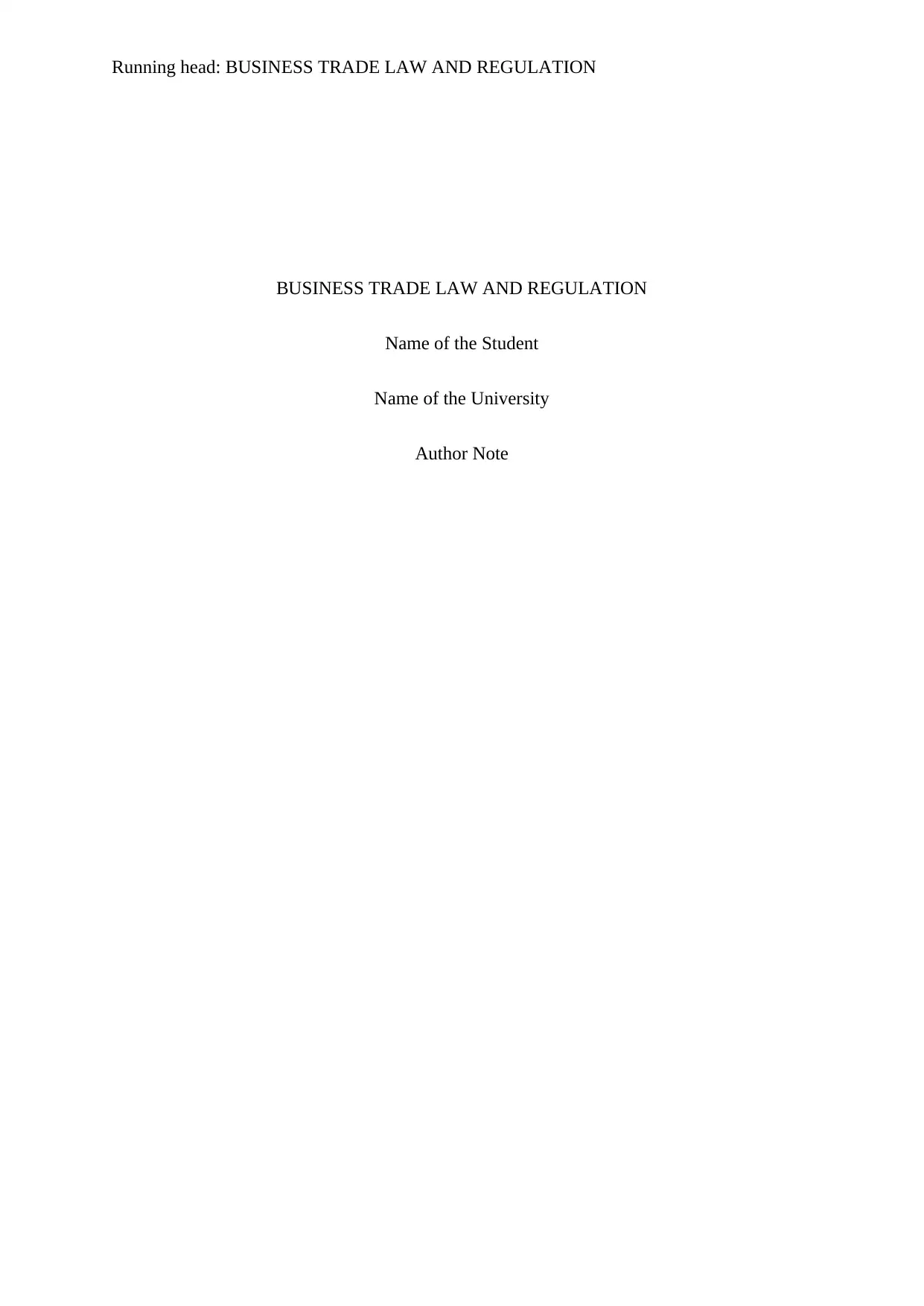
Running head: BUSINESS TRADE LAW AND REGULATION
BUSINESS TRADE LAW AND REGULATION
Name of the Student
Name of the University
Author Note
BUSINESS TRADE LAW AND REGULATION
Name of the Student
Name of the University
Author Note
Paraphrase This Document
Need a fresh take? Get an instant paraphrase of this document with our AI Paraphraser
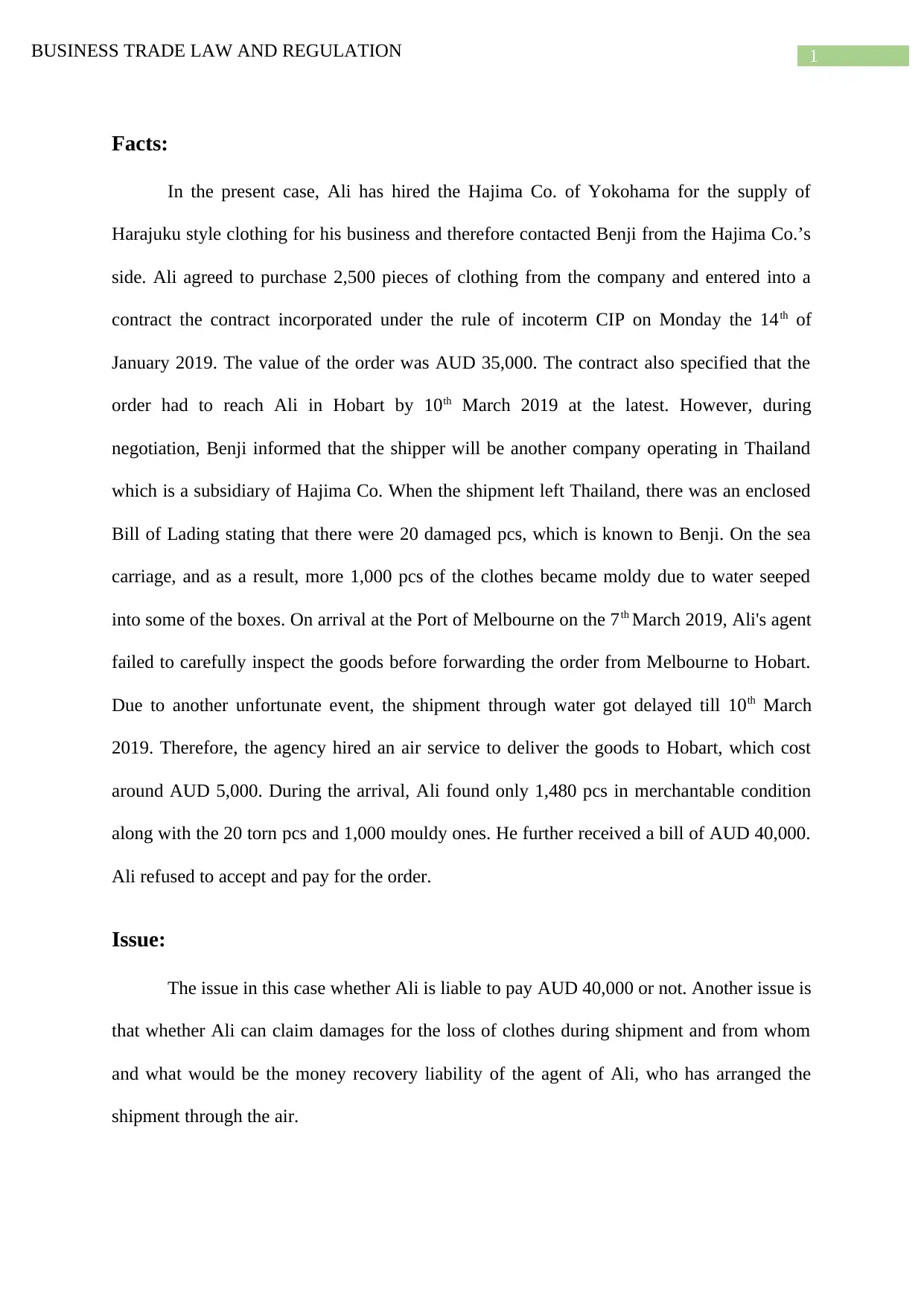
1BUSINESS TRADE LAW AND REGULATION
Facts:
In the present case, Ali has hired the Hajima Co. of Yokohama for the supply of
Harajuku style clothing for his business and therefore contacted Benji from the Hajima Co.’s
side. Ali agreed to purchase 2,500 pieces of clothing from the company and entered into a
contract the contract incorporated under the rule of incoterm CIP on Monday the 14th of
January 2019. The value of the order was AUD 35,000. The contract also specified that the
order had to reach Ali in Hobart by 10th March 2019 at the latest. However, during
negotiation, Benji informed that the shipper will be another company operating in Thailand
which is a subsidiary of Hajima Co. When the shipment left Thailand, there was an enclosed
Bill of Lading stating that there were 20 damaged pcs, which is known to Benji. On the sea
carriage, and as a result, more 1,000 pcs of the clothes became moldy due to water seeped
into some of the boxes. On arrival at the Port of Melbourne on the 7th March 2019, Ali's agent
failed to carefully inspect the goods before forwarding the order from Melbourne to Hobart.
Due to another unfortunate event, the shipment through water got delayed till 10th March
2019. Therefore, the agency hired an air service to deliver the goods to Hobart, which cost
around AUD 5,000. During the arrival, Ali found only 1,480 pcs in merchantable condition
along with the 20 torn pcs and 1,000 mouldy ones. He further received a bill of AUD 40,000.
Ali refused to accept and pay for the order.
Issue:
The issue in this case whether Ali is liable to pay AUD 40,000 or not. Another issue is
that whether Ali can claim damages for the loss of clothes during shipment and from whom
and what would be the money recovery liability of the agent of Ali, who has arranged the
shipment through the air.
Facts:
In the present case, Ali has hired the Hajima Co. of Yokohama for the supply of
Harajuku style clothing for his business and therefore contacted Benji from the Hajima Co.’s
side. Ali agreed to purchase 2,500 pieces of clothing from the company and entered into a
contract the contract incorporated under the rule of incoterm CIP on Monday the 14th of
January 2019. The value of the order was AUD 35,000. The contract also specified that the
order had to reach Ali in Hobart by 10th March 2019 at the latest. However, during
negotiation, Benji informed that the shipper will be another company operating in Thailand
which is a subsidiary of Hajima Co. When the shipment left Thailand, there was an enclosed
Bill of Lading stating that there were 20 damaged pcs, which is known to Benji. On the sea
carriage, and as a result, more 1,000 pcs of the clothes became moldy due to water seeped
into some of the boxes. On arrival at the Port of Melbourne on the 7th March 2019, Ali's agent
failed to carefully inspect the goods before forwarding the order from Melbourne to Hobart.
Due to another unfortunate event, the shipment through water got delayed till 10th March
2019. Therefore, the agency hired an air service to deliver the goods to Hobart, which cost
around AUD 5,000. During the arrival, Ali found only 1,480 pcs in merchantable condition
along with the 20 torn pcs and 1,000 mouldy ones. He further received a bill of AUD 40,000.
Ali refused to accept and pay for the order.
Issue:
The issue in this case whether Ali is liable to pay AUD 40,000 or not. Another issue is
that whether Ali can claim damages for the loss of clothes during shipment and from whom
and what would be the money recovery liability of the agent of Ali, who has arranged the
shipment through the air.
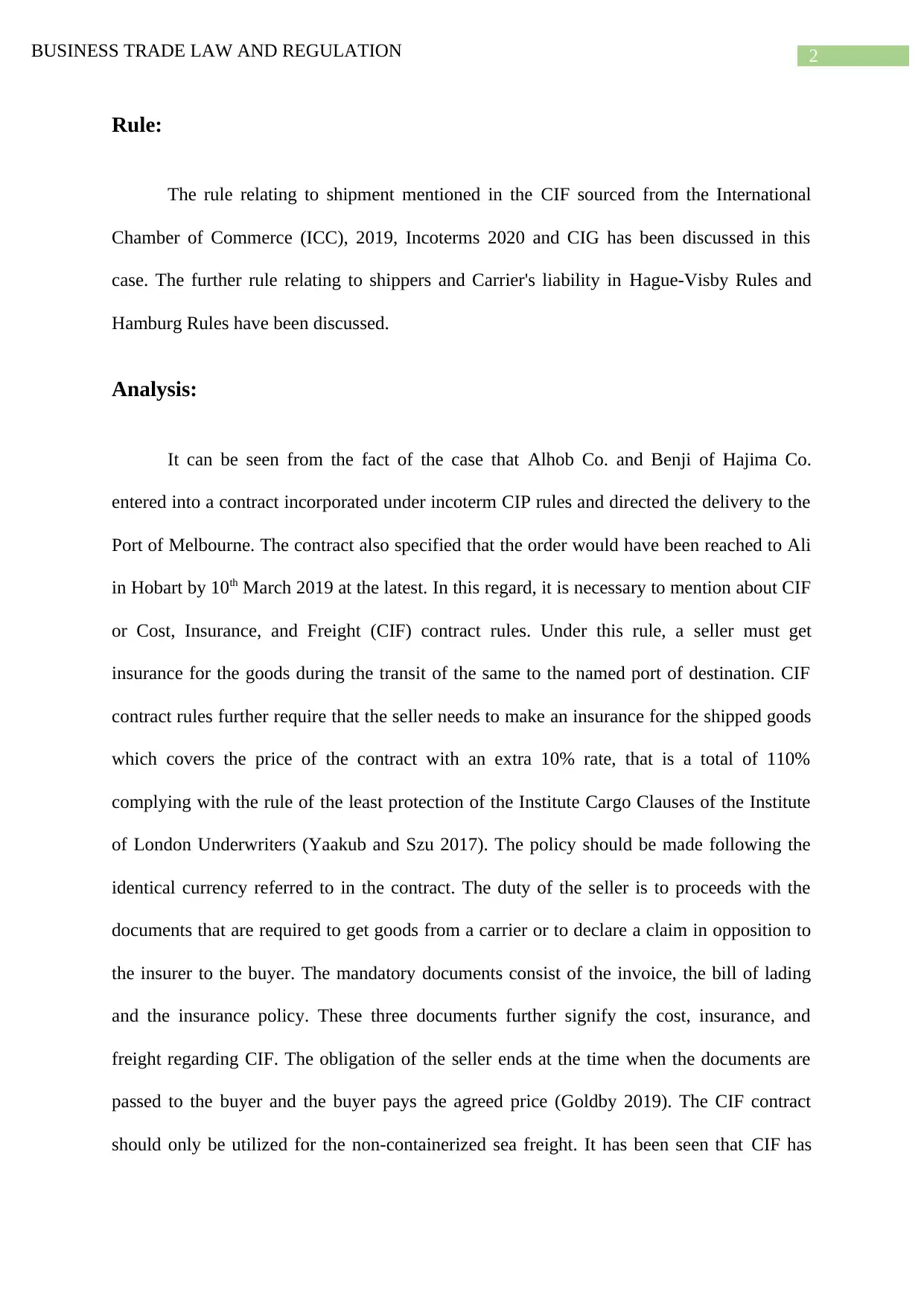
2BUSINESS TRADE LAW AND REGULATION
Rule:
The rule relating to shipment mentioned in the CIF sourced from the International
Chamber of Commerce (ICC), 2019, Incoterms 2020 and CIG has been discussed in this
case. The further rule relating to shippers and Carrier's liability in Hague-Visby Rules and
Hamburg Rules have been discussed.
Analysis:
It can be seen from the fact of the case that Alhob Co. and Benji of Hajima Co.
entered into a contract incorporated under incoterm CIP rules and directed the delivery to the
Port of Melbourne. The contract also specified that the order would have been reached to Ali
in Hobart by 10th March 2019 at the latest. In this regard, it is necessary to mention about CIF
or Cost, Insurance, and Freight (CIF) contract rules. Under this rule, a seller must get
insurance for the goods during the transit of the same to the named port of destination. CIF
contract rules further require that the seller needs to make an insurance for the shipped goods
which covers the price of the contract with an extra 10% rate, that is a total of 110%
complying with the rule of the least protection of the Institute Cargo Clauses of the Institute
of London Underwriters (Yaakub and Szu 2017). The policy should be made following the
identical currency referred to in the contract. The duty of the seller is to proceeds with the
documents that are required to get goods from a carrier or to declare a claim in opposition to
the insurer to the buyer. The mandatory documents consist of the invoice, the bill of lading
and the insurance policy. These three documents further signify the cost, insurance, and
freight regarding CIF. The obligation of the seller ends at the time when the documents are
passed to the buyer and the buyer pays the agreed price (Goldby 2019). The CIF contract
should only be utilized for the non-containerized sea freight. It has been seen that CIF has
Rule:
The rule relating to shipment mentioned in the CIF sourced from the International
Chamber of Commerce (ICC), 2019, Incoterms 2020 and CIG has been discussed in this
case. The further rule relating to shippers and Carrier's liability in Hague-Visby Rules and
Hamburg Rules have been discussed.
Analysis:
It can be seen from the fact of the case that Alhob Co. and Benji of Hajima Co.
entered into a contract incorporated under incoterm CIP rules and directed the delivery to the
Port of Melbourne. The contract also specified that the order would have been reached to Ali
in Hobart by 10th March 2019 at the latest. In this regard, it is necessary to mention about CIF
or Cost, Insurance, and Freight (CIF) contract rules. Under this rule, a seller must get
insurance for the goods during the transit of the same to the named port of destination. CIF
contract rules further require that the seller needs to make an insurance for the shipped goods
which covers the price of the contract with an extra 10% rate, that is a total of 110%
complying with the rule of the least protection of the Institute Cargo Clauses of the Institute
of London Underwriters (Yaakub and Szu 2017). The policy should be made following the
identical currency referred to in the contract. The duty of the seller is to proceeds with the
documents that are required to get goods from a carrier or to declare a claim in opposition to
the insurer to the buyer. The mandatory documents consist of the invoice, the bill of lading
and the insurance policy. These three documents further signify the cost, insurance, and
freight regarding CIF. The obligation of the seller ends at the time when the documents are
passed to the buyer and the buyer pays the agreed price (Goldby 2019). The CIF contract
should only be utilized for the non-containerized sea freight. It has been seen that CIF has
⊘ This is a preview!⊘
Do you want full access?
Subscribe today to unlock all pages.

Trusted by 1+ million students worldwide
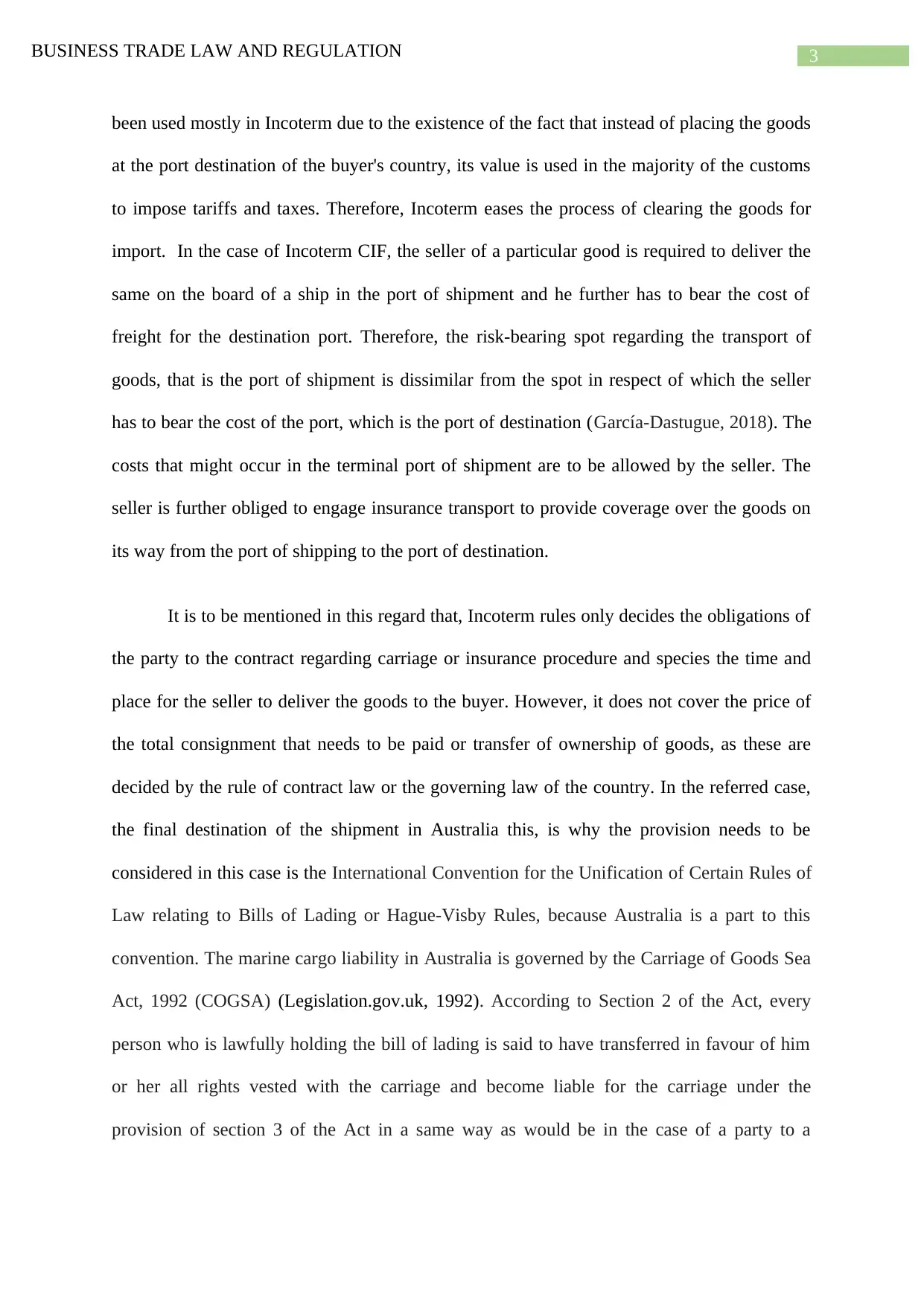
3BUSINESS TRADE LAW AND REGULATION
been used mostly in Incoterm due to the existence of the fact that instead of placing the goods
at the port destination of the buyer's country, its value is used in the majority of the customs
to impose tariffs and taxes. Therefore, Incoterm eases the process of clearing the goods for
import. In the case of Incoterm CIF, the seller of a particular good is required to deliver the
same on the board of a ship in the port of shipment and he further has to bear the cost of
freight for the destination port. Therefore, the risk-bearing spot regarding the transport of
goods, that is the port of shipment is dissimilar from the spot in respect of which the seller
has to bear the cost of the port, which is the port of destination (García-Dastugue, 2018). The
costs that might occur in the terminal port of shipment are to be allowed by the seller. The
seller is further obliged to engage insurance transport to provide coverage over the goods on
its way from the port of shipping to the port of destination.
It is to be mentioned in this regard that, Incoterm rules only decides the obligations of
the party to the contract regarding carriage or insurance procedure and species the time and
place for the seller to deliver the goods to the buyer. However, it does not cover the price of
the total consignment that needs to be paid or transfer of ownership of goods, as these are
decided by the rule of contract law or the governing law of the country. In the referred case,
the final destination of the shipment in Australia this, is why the provision needs to be
considered in this case is the International Convention for the Unification of Certain Rules of
Law relating to Bills of Lading or Hague-Visby Rules, because Australia is a part to this
convention. The marine cargo liability in Australia is governed by the Carriage of Goods Sea
Act, 1992 (COGSA) (Legislation.gov.uk, 1992). According to Section 2 of the Act, every
person who is lawfully holding the bill of lading is said to have transferred in favour of him
or her all rights vested with the carriage and become liable for the carriage under the
provision of section 3 of the Act in a same way as would be in the case of a party to a
been used mostly in Incoterm due to the existence of the fact that instead of placing the goods
at the port destination of the buyer's country, its value is used in the majority of the customs
to impose tariffs and taxes. Therefore, Incoterm eases the process of clearing the goods for
import. In the case of Incoterm CIF, the seller of a particular good is required to deliver the
same on the board of a ship in the port of shipment and he further has to bear the cost of
freight for the destination port. Therefore, the risk-bearing spot regarding the transport of
goods, that is the port of shipment is dissimilar from the spot in respect of which the seller
has to bear the cost of the port, which is the port of destination (García-Dastugue, 2018). The
costs that might occur in the terminal port of shipment are to be allowed by the seller. The
seller is further obliged to engage insurance transport to provide coverage over the goods on
its way from the port of shipping to the port of destination.
It is to be mentioned in this regard that, Incoterm rules only decides the obligations of
the party to the contract regarding carriage or insurance procedure and species the time and
place for the seller to deliver the goods to the buyer. However, it does not cover the price of
the total consignment that needs to be paid or transfer of ownership of goods, as these are
decided by the rule of contract law or the governing law of the country. In the referred case,
the final destination of the shipment in Australia this, is why the provision needs to be
considered in this case is the International Convention for the Unification of Certain Rules of
Law relating to Bills of Lading or Hague-Visby Rules, because Australia is a part to this
convention. The marine cargo liability in Australia is governed by the Carriage of Goods Sea
Act, 1992 (COGSA) (Legislation.gov.uk, 1992). According to Section 2 of the Act, every
person who is lawfully holding the bill of lading is said to have transferred in favour of him
or her all rights vested with the carriage and become liable for the carriage under the
provision of section 3 of the Act in a same way as would be in the case of a party to a
Paraphrase This Document
Need a fresh take? Get an instant paraphrase of this document with our AI Paraphraser
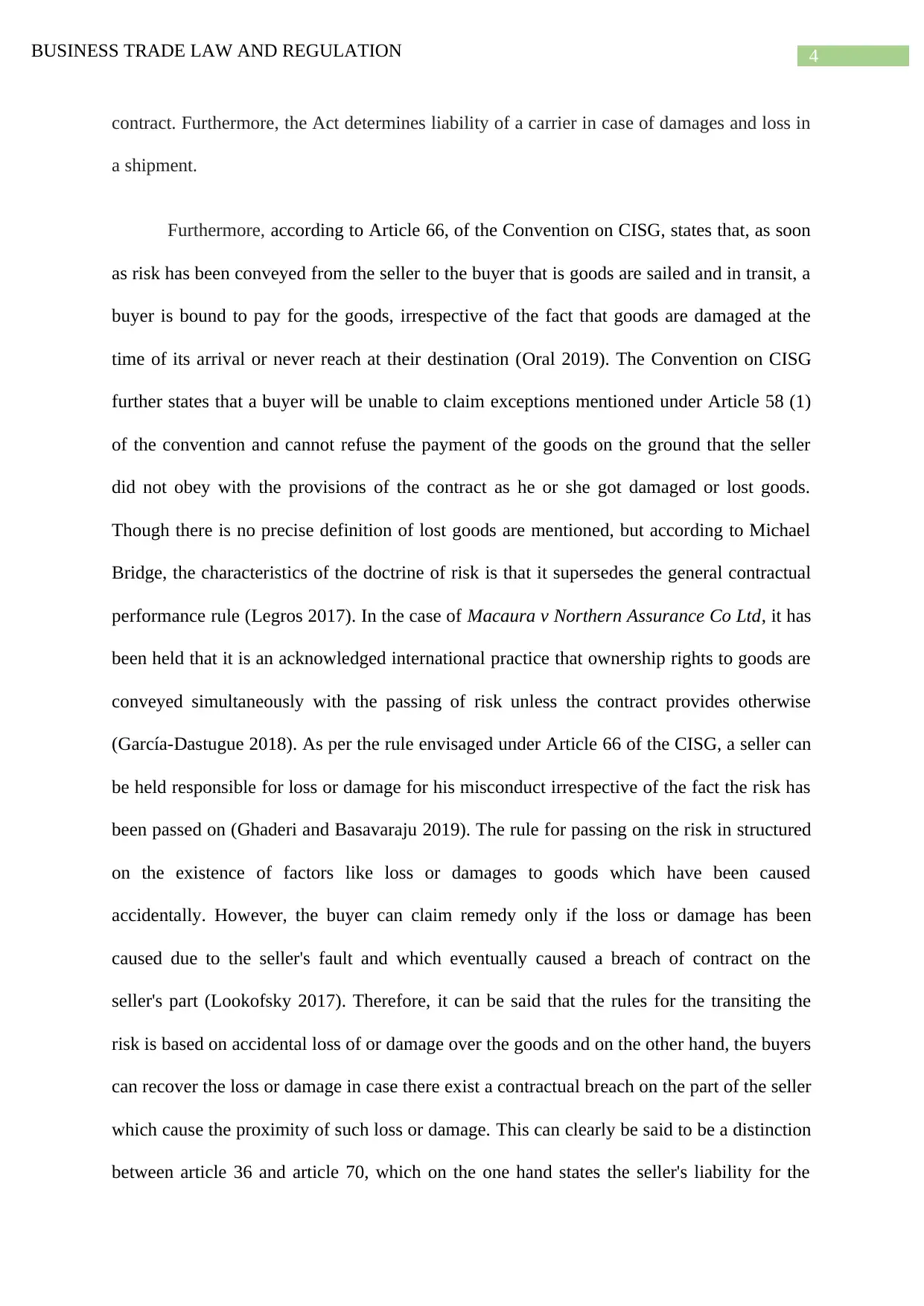
4BUSINESS TRADE LAW AND REGULATION
contract. Furthermore, the Act determines liability of a carrier in case of damages and loss in
a shipment.
Furthermore, according to Article 66, of the Convention on CISG, states that, as soon
as risk has been conveyed from the seller to the buyer that is goods are sailed and in transit, a
buyer is bound to pay for the goods, irrespective of the fact that goods are damaged at the
time of its arrival or never reach at their destination (Oral 2019). The Convention on CISG
further states that a buyer will be unable to claim exceptions mentioned under Article 58 (1)
of the convention and cannot refuse the payment of the goods on the ground that the seller
did not obey with the provisions of the contract as he or she got damaged or lost goods.
Though there is no precise definition of lost goods are mentioned, but according to Michael
Bridge, the characteristics of the doctrine of risk is that it supersedes the general contractual
performance rule (Legros 2017). In the case of Macaura v Northern Assurance Co Ltd, it has
been held that it is an acknowledged international practice that ownership rights to goods are
conveyed simultaneously with the passing of risk unless the contract provides otherwise
(García-Dastugue 2018). As per the rule envisaged under Article 66 of the CISG, a seller can
be held responsible for loss or damage for his misconduct irrespective of the fact the risk has
been passed on (Ghaderi and Basavaraju 2019). The rule for passing on the risk in structured
on the existence of factors like loss or damages to goods which have been caused
accidentally. However, the buyer can claim remedy only if the loss or damage has been
caused due to the seller's fault and which eventually caused a breach of contract on the
seller's part (Lookofsky 2017). Therefore, it can be said that the rules for the transiting the
risk is based on accidental loss of or damage over the goods and on the other hand, the buyers
can recover the loss or damage in case there exist a contractual breach on the part of the seller
which cause the proximity of such loss or damage. This can clearly be said to be a distinction
between article 36 and article 70, which on the one hand states the seller's liability for the
contract. Furthermore, the Act determines liability of a carrier in case of damages and loss in
a shipment.
Furthermore, according to Article 66, of the Convention on CISG, states that, as soon
as risk has been conveyed from the seller to the buyer that is goods are sailed and in transit, a
buyer is bound to pay for the goods, irrespective of the fact that goods are damaged at the
time of its arrival or never reach at their destination (Oral 2019). The Convention on CISG
further states that a buyer will be unable to claim exceptions mentioned under Article 58 (1)
of the convention and cannot refuse the payment of the goods on the ground that the seller
did not obey with the provisions of the contract as he or she got damaged or lost goods.
Though there is no precise definition of lost goods are mentioned, but according to Michael
Bridge, the characteristics of the doctrine of risk is that it supersedes the general contractual
performance rule (Legros 2017). In the case of Macaura v Northern Assurance Co Ltd, it has
been held that it is an acknowledged international practice that ownership rights to goods are
conveyed simultaneously with the passing of risk unless the contract provides otherwise
(García-Dastugue 2018). As per the rule envisaged under Article 66 of the CISG, a seller can
be held responsible for loss or damage for his misconduct irrespective of the fact the risk has
been passed on (Ghaderi and Basavaraju 2019). The rule for passing on the risk in structured
on the existence of factors like loss or damages to goods which have been caused
accidentally. However, the buyer can claim remedy only if the loss or damage has been
caused due to the seller's fault and which eventually caused a breach of contract on the
seller's part (Lookofsky 2017). Therefore, it can be said that the rules for the transiting the
risk is based on accidental loss of or damage over the goods and on the other hand, the buyers
can recover the loss or damage in case there exist a contractual breach on the part of the seller
which cause the proximity of such loss or damage. This can clearly be said to be a distinction
between article 36 and article 70, which on the one hand states the seller's liability for the
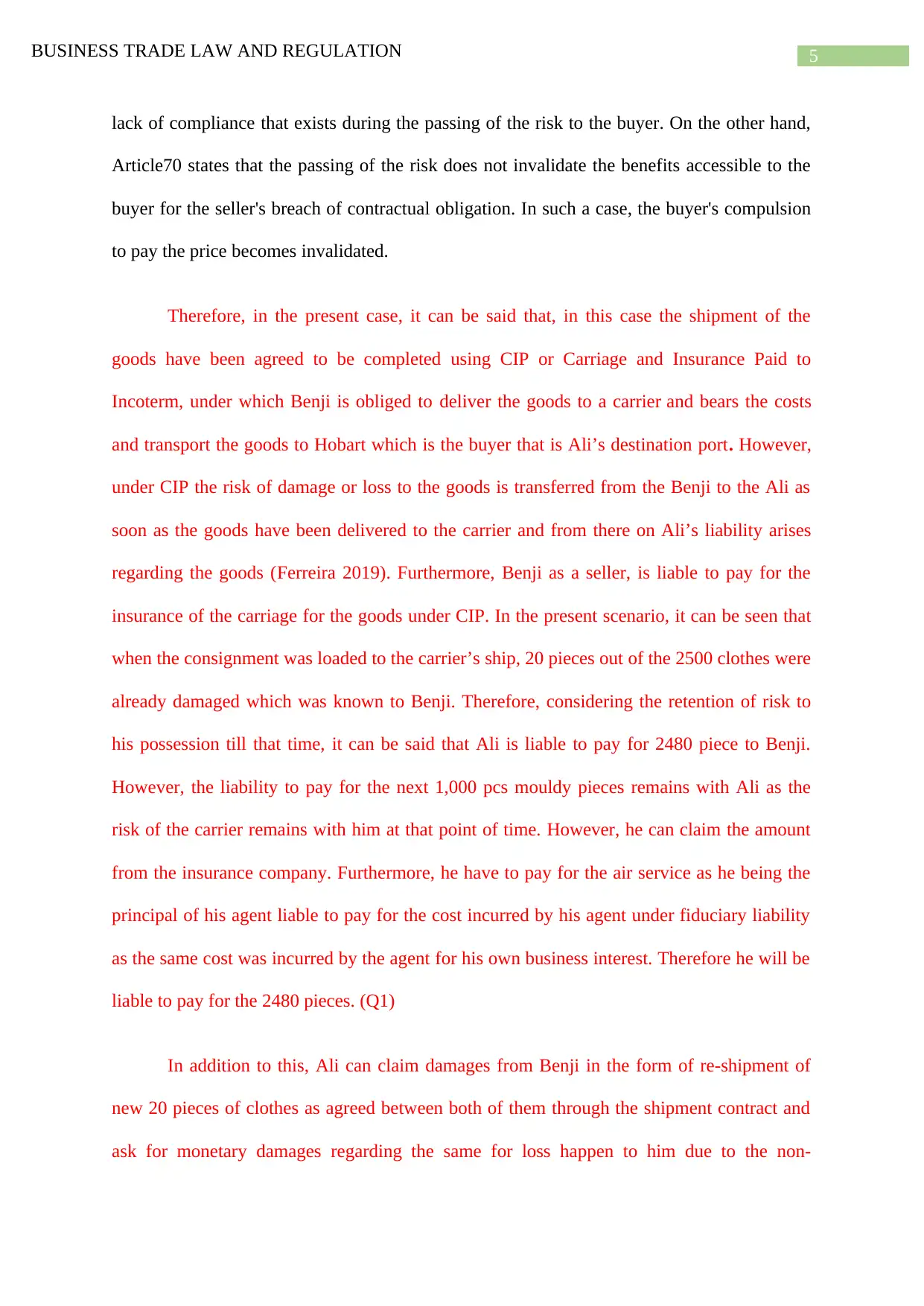
5BUSINESS TRADE LAW AND REGULATION
lack of compliance that exists during the passing of the risk to the buyer. On the other hand,
Article70 states that the passing of the risk does not invalidate the benefits accessible to the
buyer for the seller's breach of contractual obligation. In such a case, the buyer's compulsion
to pay the price becomes invalidated.
Therefore, in the present case, it can be said that, in this case the shipment of the
goods have been agreed to be completed using CIP or Carriage and Insurance Paid to
Incoterm, under which Benji is obliged to deliver the goods to a carrier and bears the costs
and transport the goods to Hobart which is the buyer that is Ali’s destination port. However,
under CIP the risk of damage or loss to the goods is transferred from the Benji to the Ali as
soon as the goods have been delivered to the carrier and from there on Ali’s liability arises
regarding the goods (Ferreira 2019). Furthermore, Benji as a seller, is liable to pay for the
insurance of the carriage for the goods under CIP. In the present scenario, it can be seen that
when the consignment was loaded to the carrier’s ship, 20 pieces out of the 2500 clothes were
already damaged which was known to Benji. Therefore, considering the retention of risk to
his possession till that time, it can be said that Ali is liable to pay for 2480 piece to Benji.
However, the liability to pay for the next 1,000 pcs mouldy pieces remains with Ali as the
risk of the carrier remains with him at that point of time. However, he can claim the amount
from the insurance company. Furthermore, he have to pay for the air service as he being the
principal of his agent liable to pay for the cost incurred by his agent under fiduciary liability
as the same cost was incurred by the agent for his own business interest. Therefore he will be
liable to pay for the 2480 pieces. (Q1)
In addition to this, Ali can claim damages from Benji in the form of re-shipment of
new 20 pieces of clothes as agreed between both of them through the shipment contract and
ask for monetary damages regarding the same for loss happen to him due to the non-
lack of compliance that exists during the passing of the risk to the buyer. On the other hand,
Article70 states that the passing of the risk does not invalidate the benefits accessible to the
buyer for the seller's breach of contractual obligation. In such a case, the buyer's compulsion
to pay the price becomes invalidated.
Therefore, in the present case, it can be said that, in this case the shipment of the
goods have been agreed to be completed using CIP or Carriage and Insurance Paid to
Incoterm, under which Benji is obliged to deliver the goods to a carrier and bears the costs
and transport the goods to Hobart which is the buyer that is Ali’s destination port. However,
under CIP the risk of damage or loss to the goods is transferred from the Benji to the Ali as
soon as the goods have been delivered to the carrier and from there on Ali’s liability arises
regarding the goods (Ferreira 2019). Furthermore, Benji as a seller, is liable to pay for the
insurance of the carriage for the goods under CIP. In the present scenario, it can be seen that
when the consignment was loaded to the carrier’s ship, 20 pieces out of the 2500 clothes were
already damaged which was known to Benji. Therefore, considering the retention of risk to
his possession till that time, it can be said that Ali is liable to pay for 2480 piece to Benji.
However, the liability to pay for the next 1,000 pcs mouldy pieces remains with Ali as the
risk of the carrier remains with him at that point of time. However, he can claim the amount
from the insurance company. Furthermore, he have to pay for the air service as he being the
principal of his agent liable to pay for the cost incurred by his agent under fiduciary liability
as the same cost was incurred by the agent for his own business interest. Therefore he will be
liable to pay for the 2480 pieces. (Q1)
In addition to this, Ali can claim damages from Benji in the form of re-shipment of
new 20 pieces of clothes as agreed between both of them through the shipment contract and
ask for monetary damages regarding the same for loss happen to him due to the non-
⊘ This is a preview!⊘
Do you want full access?
Subscribe today to unlock all pages.

Trusted by 1+ million students worldwide
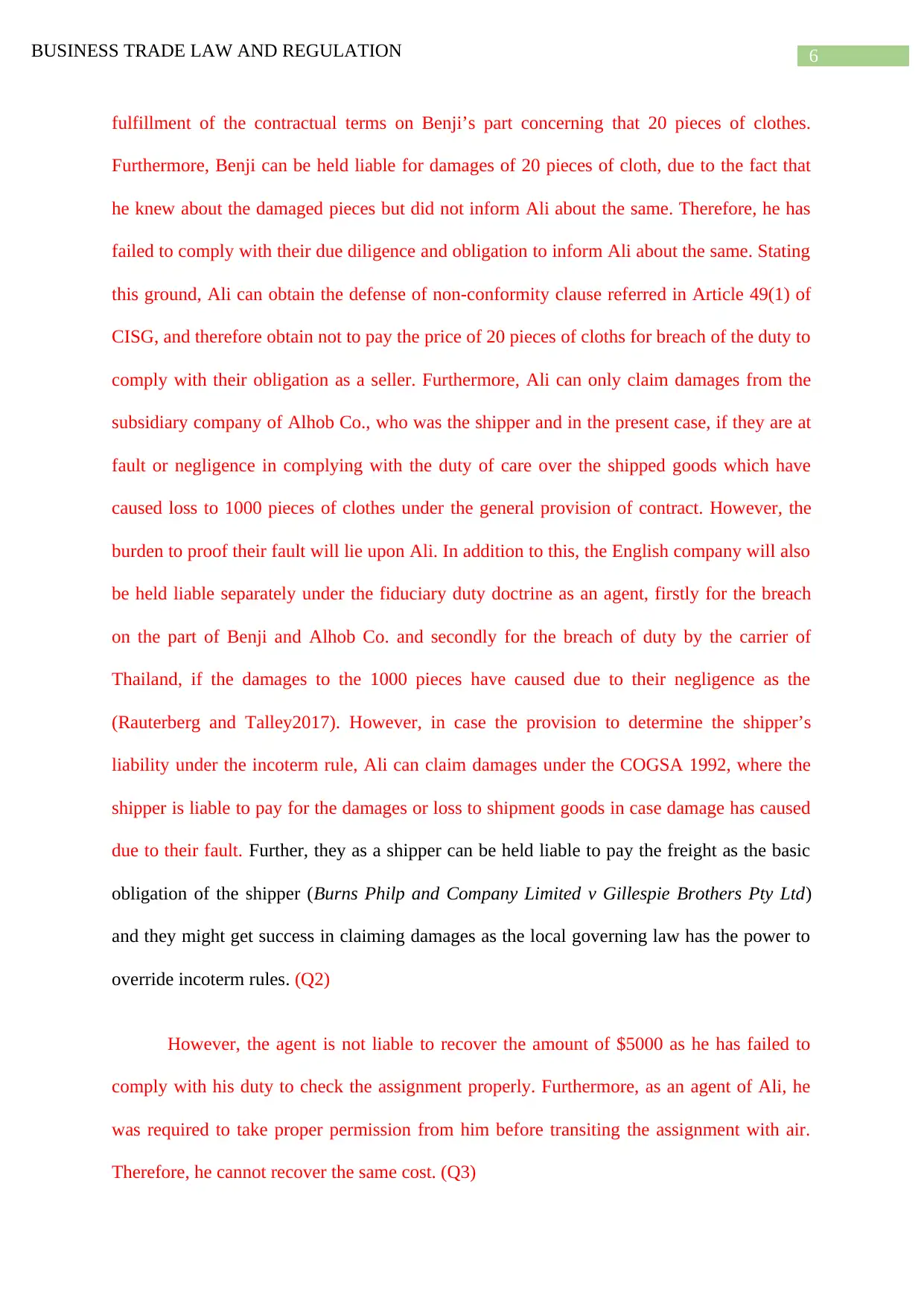
6BUSINESS TRADE LAW AND REGULATION
fulfillment of the contractual terms on Benji’s part concerning that 20 pieces of clothes.
Furthermore, Benji can be held liable for damages of 20 pieces of cloth, due to the fact that
he knew about the damaged pieces but did not inform Ali about the same. Therefore, he has
failed to comply with their due diligence and obligation to inform Ali about the same. Stating
this ground, Ali can obtain the defense of non-conformity clause referred in Article 49(1) of
CISG, and therefore obtain not to pay the price of 20 pieces of cloths for breach of the duty to
comply with their obligation as a seller. Furthermore, Ali can only claim damages from the
subsidiary company of Alhob Co., who was the shipper and in the present case, if they are at
fault or negligence in complying with the duty of care over the shipped goods which have
caused loss to 1000 pieces of clothes under the general provision of contract. However, the
burden to proof their fault will lie upon Ali. In addition to this, the English company will also
be held liable separately under the fiduciary duty doctrine as an agent, firstly for the breach
on the part of Benji and Alhob Co. and secondly for the breach of duty by the carrier of
Thailand, if the damages to the 1000 pieces have caused due to their negligence as the
(Rauterberg and Talley2017). However, in case the provision to determine the shipper’s
liability under the incoterm rule, Ali can claim damages under the COGSA 1992, where the
shipper is liable to pay for the damages or loss to shipment goods in case damage has caused
due to their fault. Further, they as a shipper can be held liable to pay the freight as the basic
obligation of the shipper (Burns Philp and Company Limited v Gillespie Brothers Pty Ltd)
and they might get success in claiming damages as the local governing law has the power to
override incoterm rules. (Q2)
However, the agent is not liable to recover the amount of $5000 as he has failed to
comply with his duty to check the assignment properly. Furthermore, as an agent of Ali, he
was required to take proper permission from him before transiting the assignment with air.
Therefore, he cannot recover the same cost. (Q3)
fulfillment of the contractual terms on Benji’s part concerning that 20 pieces of clothes.
Furthermore, Benji can be held liable for damages of 20 pieces of cloth, due to the fact that
he knew about the damaged pieces but did not inform Ali about the same. Therefore, he has
failed to comply with their due diligence and obligation to inform Ali about the same. Stating
this ground, Ali can obtain the defense of non-conformity clause referred in Article 49(1) of
CISG, and therefore obtain not to pay the price of 20 pieces of cloths for breach of the duty to
comply with their obligation as a seller. Furthermore, Ali can only claim damages from the
subsidiary company of Alhob Co., who was the shipper and in the present case, if they are at
fault or negligence in complying with the duty of care over the shipped goods which have
caused loss to 1000 pieces of clothes under the general provision of contract. However, the
burden to proof their fault will lie upon Ali. In addition to this, the English company will also
be held liable separately under the fiduciary duty doctrine as an agent, firstly for the breach
on the part of Benji and Alhob Co. and secondly for the breach of duty by the carrier of
Thailand, if the damages to the 1000 pieces have caused due to their negligence as the
(Rauterberg and Talley2017). However, in case the provision to determine the shipper’s
liability under the incoterm rule, Ali can claim damages under the COGSA 1992, where the
shipper is liable to pay for the damages or loss to shipment goods in case damage has caused
due to their fault. Further, they as a shipper can be held liable to pay the freight as the basic
obligation of the shipper (Burns Philp and Company Limited v Gillespie Brothers Pty Ltd)
and they might get success in claiming damages as the local governing law has the power to
override incoterm rules. (Q2)
However, the agent is not liable to recover the amount of $5000 as he has failed to
comply with his duty to check the assignment properly. Furthermore, as an agent of Ali, he
was required to take proper permission from him before transiting the assignment with air.
Therefore, he cannot recover the same cost. (Q3)
Paraphrase This Document
Need a fresh take? Get an instant paraphrase of this document with our AI Paraphraser
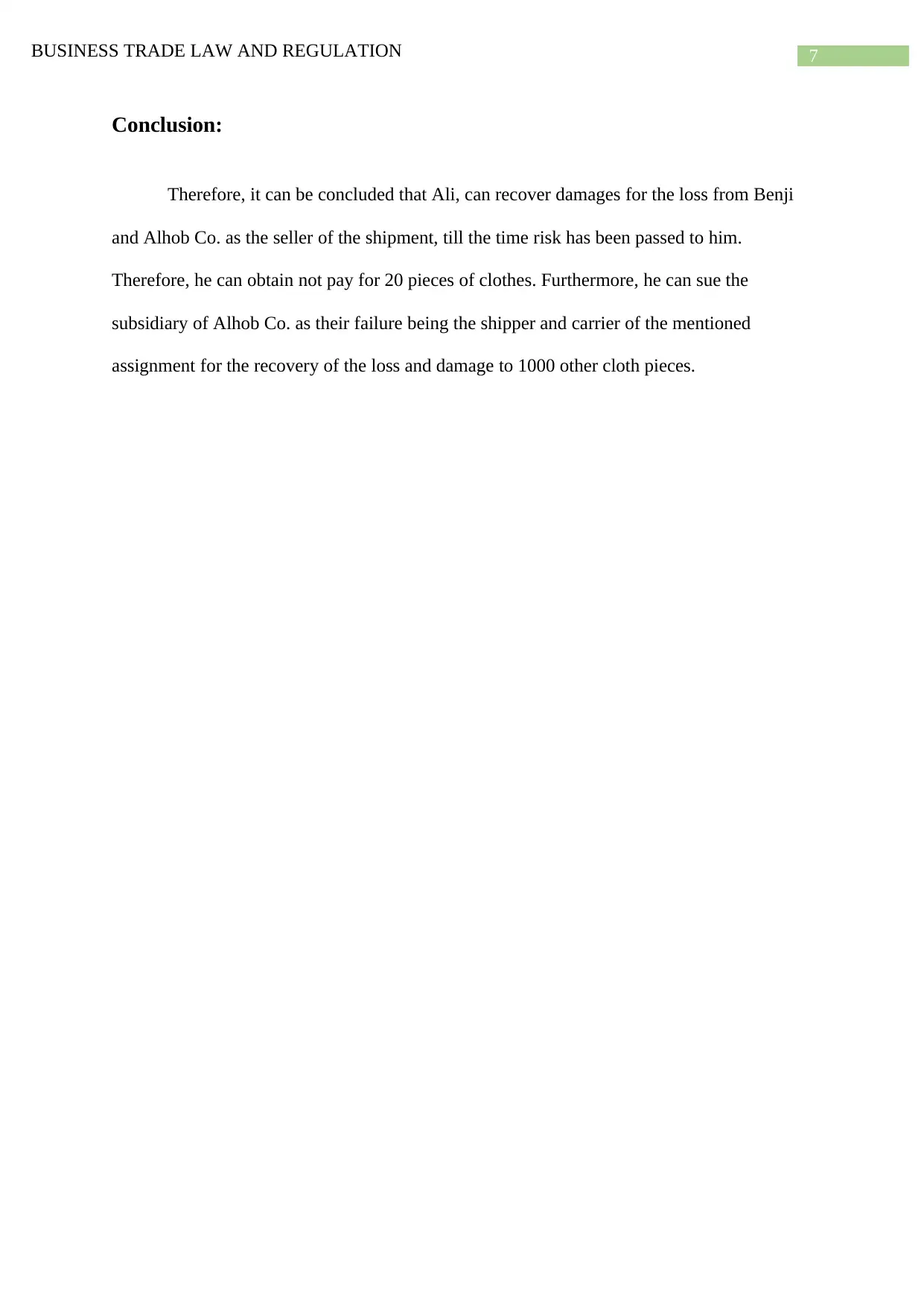
7BUSINESS TRADE LAW AND REGULATION
Conclusion:
Therefore, it can be concluded that Ali, can recover damages for the loss from Benji
and Alhob Co. as the seller of the shipment, till the time risk has been passed to him.
Therefore, he can obtain not pay for 20 pieces of clothes. Furthermore, he can sue the
subsidiary of Alhob Co. as their failure being the shipper and carrier of the mentioned
assignment for the recovery of the loss and damage to 1000 other cloth pieces.
Conclusion:
Therefore, it can be concluded that Ali, can recover damages for the loss from Benji
and Alhob Co. as the seller of the shipment, till the time risk has been passed to him.
Therefore, he can obtain not pay for 20 pieces of clothes. Furthermore, he can sue the
subsidiary of Alhob Co. as their failure being the shipper and carrier of the mentioned
assignment for the recovery of the loss and damage to 1000 other cloth pieces.
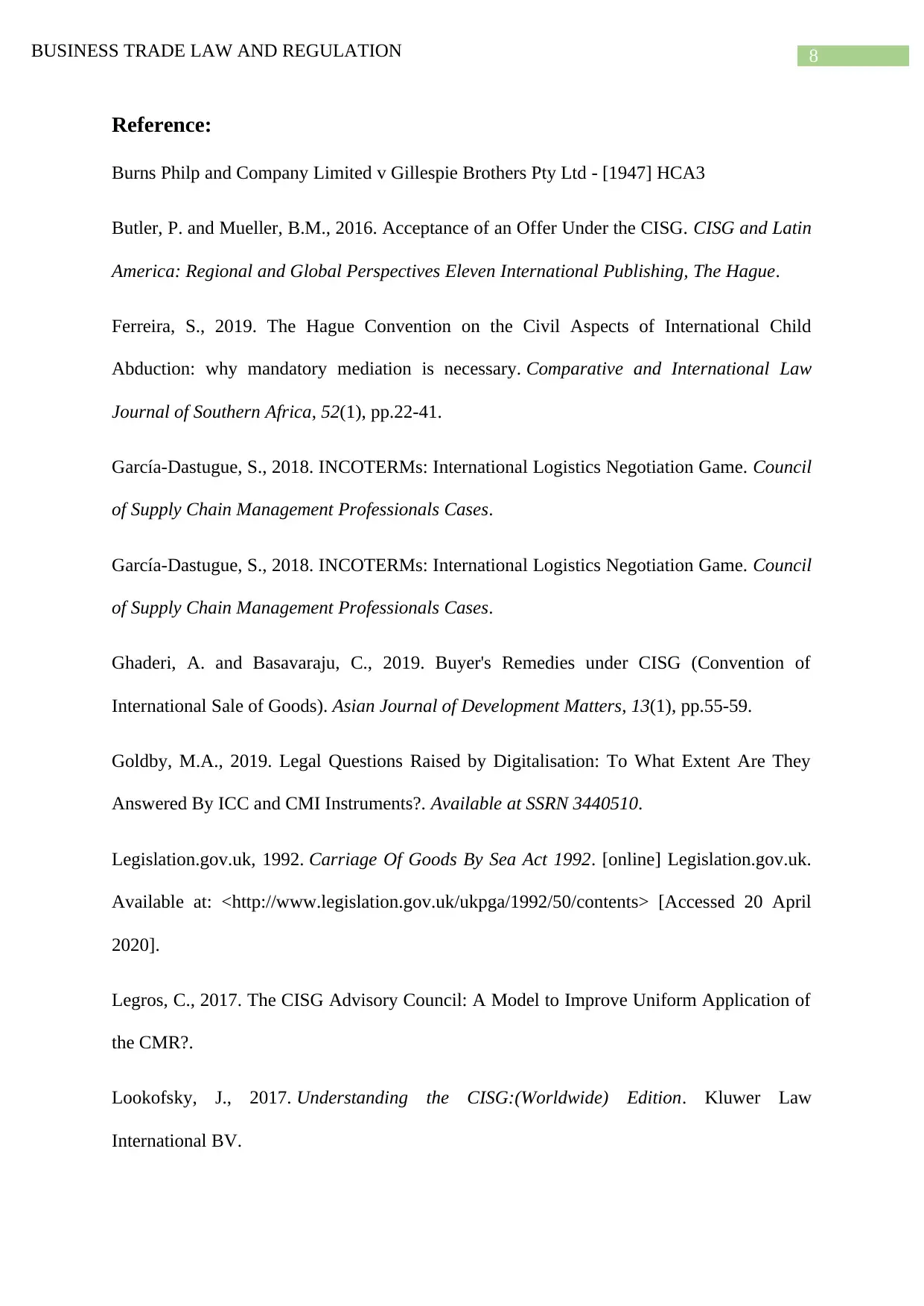
8BUSINESS TRADE LAW AND REGULATION
Reference:
Burns Philp and Company Limited v Gillespie Brothers Pty Ltd - [1947] HCA3
Butler, P. and Mueller, B.M., 2016. Acceptance of an Offer Under the CISG. CISG and Latin
America: Regional and Global Perspectives Eleven International Publishing, The Hague.
Ferreira, S., 2019. The Hague Convention on the Civil Aspects of International Child
Abduction: why mandatory mediation is necessary. Comparative and International Law
Journal of Southern Africa, 52(1), pp.22-41.
García-Dastugue, S., 2018. INCOTERMs: International Logistics Negotiation Game. Council
of Supply Chain Management Professionals Cases.
García-Dastugue, S., 2018. INCOTERMs: International Logistics Negotiation Game. Council
of Supply Chain Management Professionals Cases.
Ghaderi, A. and Basavaraju, C., 2019. Buyer's Remedies under CISG (Convention of
International Sale of Goods). Asian Journal of Development Matters, 13(1), pp.55-59.
Goldby, M.A., 2019. Legal Questions Raised by Digitalisation: To What Extent Are They
Answered By ICC and CMI Instruments?. Available at SSRN 3440510.
Legislation.gov.uk, 1992. Carriage Of Goods By Sea Act 1992. [online] Legislation.gov.uk.
Available at: <http://www.legislation.gov.uk/ukpga/1992/50/contents> [Accessed 20 April
2020].
Legros, C., 2017. The CISG Advisory Council: A Model to Improve Uniform Application of
the CMR?.
Lookofsky, J., 2017. Understanding the CISG:(Worldwide) Edition. Kluwer Law
International BV.
Reference:
Burns Philp and Company Limited v Gillespie Brothers Pty Ltd - [1947] HCA3
Butler, P. and Mueller, B.M., 2016. Acceptance of an Offer Under the CISG. CISG and Latin
America: Regional and Global Perspectives Eleven International Publishing, The Hague.
Ferreira, S., 2019. The Hague Convention on the Civil Aspects of International Child
Abduction: why mandatory mediation is necessary. Comparative and International Law
Journal of Southern Africa, 52(1), pp.22-41.
García-Dastugue, S., 2018. INCOTERMs: International Logistics Negotiation Game. Council
of Supply Chain Management Professionals Cases.
García-Dastugue, S., 2018. INCOTERMs: International Logistics Negotiation Game. Council
of Supply Chain Management Professionals Cases.
Ghaderi, A. and Basavaraju, C., 2019. Buyer's Remedies under CISG (Convention of
International Sale of Goods). Asian Journal of Development Matters, 13(1), pp.55-59.
Goldby, M.A., 2019. Legal Questions Raised by Digitalisation: To What Extent Are They
Answered By ICC and CMI Instruments?. Available at SSRN 3440510.
Legislation.gov.uk, 1992. Carriage Of Goods By Sea Act 1992. [online] Legislation.gov.uk.
Available at: <http://www.legislation.gov.uk/ukpga/1992/50/contents> [Accessed 20 April
2020].
Legros, C., 2017. The CISG Advisory Council: A Model to Improve Uniform Application of
the CMR?.
Lookofsky, J., 2017. Understanding the CISG:(Worldwide) Edition. Kluwer Law
International BV.
⊘ This is a preview!⊘
Do you want full access?
Subscribe today to unlock all pages.

Trusted by 1+ million students worldwide
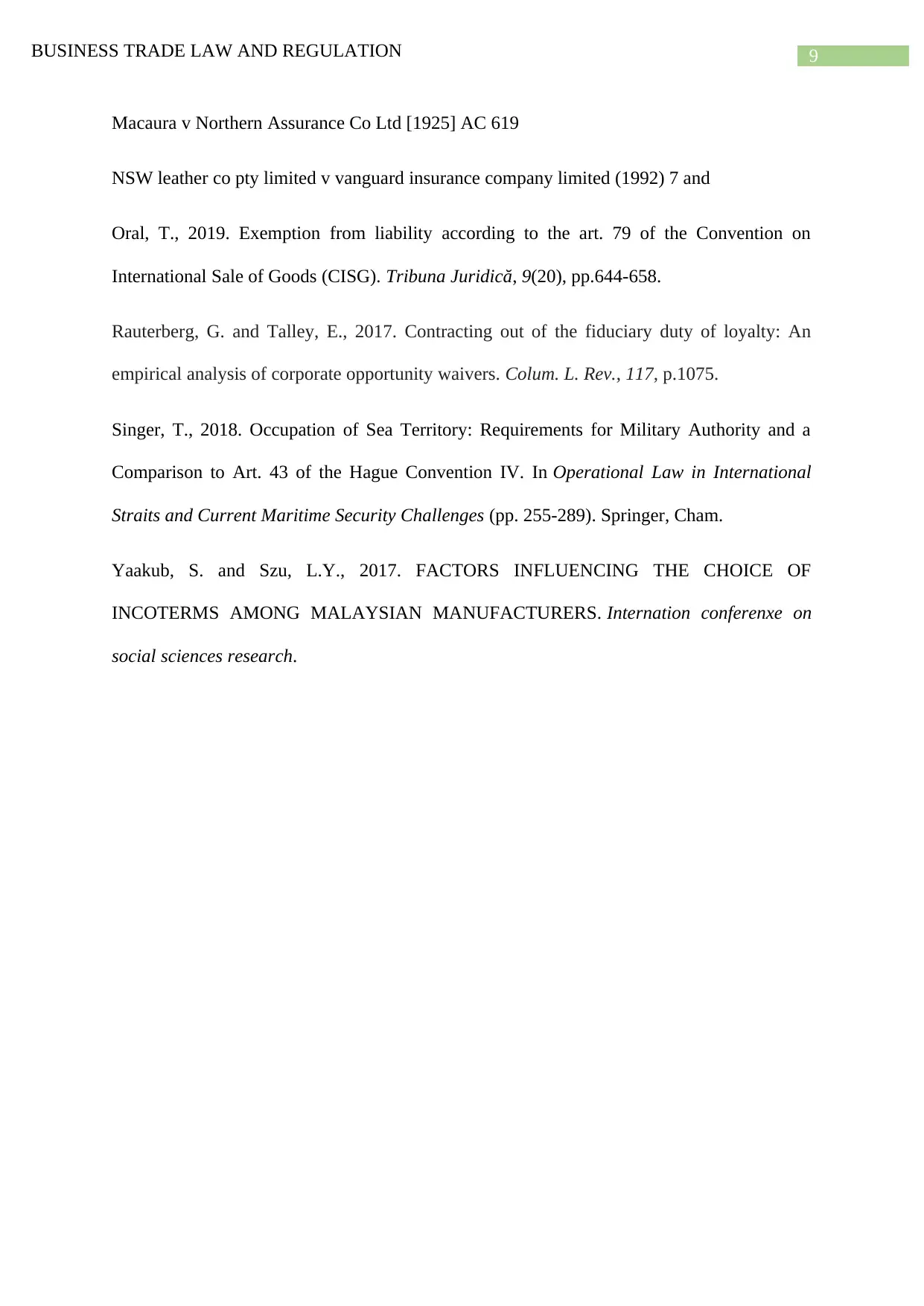
9BUSINESS TRADE LAW AND REGULATION
Macaura v Northern Assurance Co Ltd [1925] AC 619
NSW leather co pty limited v vanguard insurance company limited (1992) 7 and
Oral, T., 2019. Exemption from liability according to the art. 79 of the Convention on
International Sale of Goods (CISG). Tribuna Juridică, 9(20), pp.644-658.
Rauterberg, G. and Talley, E., 2017. Contracting out of the fiduciary duty of loyalty: An
empirical analysis of corporate opportunity waivers. Colum. L. Rev., 117, p.1075.
Singer, T., 2018. Occupation of Sea Territory: Requirements for Military Authority and a
Comparison to Art. 43 of the Hague Convention IV. In Operational Law in International
Straits and Current Maritime Security Challenges (pp. 255-289). Springer, Cham.
Yaakub, S. and Szu, L.Y., 2017. FACTORS INFLUENCING THE CHOICE OF
INCOTERMS AMONG MALAYSIAN MANUFACTURERS. Internation conferenxe on
social sciences research.
Macaura v Northern Assurance Co Ltd [1925] AC 619
NSW leather co pty limited v vanguard insurance company limited (1992) 7 and
Oral, T., 2019. Exemption from liability according to the art. 79 of the Convention on
International Sale of Goods (CISG). Tribuna Juridică, 9(20), pp.644-658.
Rauterberg, G. and Talley, E., 2017. Contracting out of the fiduciary duty of loyalty: An
empirical analysis of corporate opportunity waivers. Colum. L. Rev., 117, p.1075.
Singer, T., 2018. Occupation of Sea Territory: Requirements for Military Authority and a
Comparison to Art. 43 of the Hague Convention IV. In Operational Law in International
Straits and Current Maritime Security Challenges (pp. 255-289). Springer, Cham.
Yaakub, S. and Szu, L.Y., 2017. FACTORS INFLUENCING THE CHOICE OF
INCOTERMS AMONG MALAYSIAN MANUFACTURERS. Internation conferenxe on
social sciences research.
1 out of 10
Your All-in-One AI-Powered Toolkit for Academic Success.
+13062052269
info@desklib.com
Available 24*7 on WhatsApp / Email
![[object Object]](/_next/static/media/star-bottom.7253800d.svg)
Unlock your academic potential
Copyright © 2020–2025 A2Z Services. All Rights Reserved. Developed and managed by ZUCOL.


